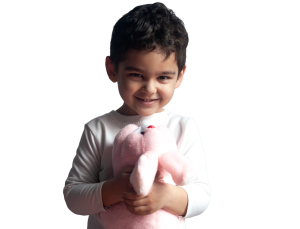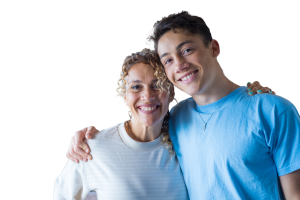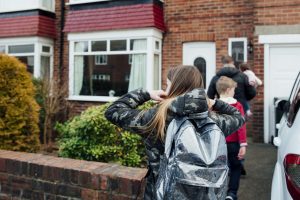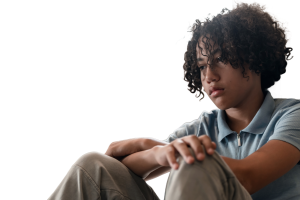Sharing our stories
Bringing up children after separation is truly one of the hardest things. We want to share our stories with you in the hope that they might help you choose to keep persevering to bring up your children together as co-parents, even though you are no longer in a relationship together.
When couples separate it’s usually a difficult process. When couples who have children separate, it’s even harder. Both of us have divorced and both of us have children. Neither of us found it easy. We decided to write this together, not to say that one of us did it the right way and one of us did it the wrong way, but to empower you in your choice of how you work with your ex to bring up your children.
We hope our honesty empowers you to think about your children at the front and centre of everything you do. Co-parenting may be the hardest but most important thing you will ever do for your children.
Ruth’s story
“The first time I had to handover my son to his dad for the night he was just a baby.”
 It was summer. It was probably a Tuesday night. My son’s father rang the doorbell to pick up our child to take him to his new flat for the first time. I answered the door and I felt sick. Our child was still so little. A baby. His dad stood on the doorstep. I clung onto our son. I didn’t want this to happen.
It was summer. It was probably a Tuesday night. My son’s father rang the doorbell to pick up our child to take him to his new flat for the first time. I answered the door and I felt sick. Our child was still so little. A baby. His dad stood on the doorstep. I clung onto our son. I didn’t want this to happen.
I didn’t want to let go. I reluctantly passed him over the threshold and he began to scream. Scream like I have never heard him scream before. And I will never ever forget that screaming for as long as I live. It was like he knew that his whole life was going to change. As though he knew it was going to be harder for him in many ways. He was protesting. I could still hear him screaming down the street.
Something primal and fundamental had been severed from me. It was a pain I don’t think I have ever fully healed from. A deep visceral pain that ran through my core.
Now it’s 12 years on. So much has happened. I’m a co-parent coach for a start. Which must mean that somewhere along the way it must have turned out ok.
And yes, in many ways it has. We share our son, we communicate well. We even all get together with new partners and new children so we can surround our son with a safe parental bubble as often as possible.
I help parents who are separating get to a place where they can talk with each other, make decisions together, protect their child as parents together. All of this provides such a fundamentally important structure for the child to grow up in. It keeps them safe and teaches them that relationships may not be perfect, but they can still work. I also tell parents the truth. That this will be the hardest thing you ever do.
Co-parenting means that you will see your child less than you want to. And that’s not easy. The thing that keeps me going is that I know, I deeply and fully know, that my son needs to be with his dad too.
Jack (Ruth’s son)
 For me growing up with divorced parents has been difficult at times, but I wouldn’t trade my family for the world. In my opinion it has changed me as a person greatly, in both positive and negative aspects. My parents split up when I was a baby. I travelled between my mum’s and dad’s houses at about a 70/ 30 split in terms of how much time I spend at each.
For me growing up with divorced parents has been difficult at times, but I wouldn’t trade my family for the world. In my opinion it has changed me as a person greatly, in both positive and negative aspects. My parents split up when I was a baby. I travelled between my mum’s and dad’s houses at about a 70/ 30 split in terms of how much time I spend at each.
As for how I have been affected by my situation growing up? I have always been afraid of confrontation and while this is something I have been growing out of more recently I will always prefer talking things out calmly as opposed to arguing. I think that it isn’t necessarily a negative thing but it does mean that I have some confidence issues.
However I will always be grateful for the constant support I have been given by my parents, the fact that they are able and willing to communicate with each other and me. The fact that they do this has helped me massively over the course of my life so far. I don’t believe that I have two families, I have one big family which functions as any other family does and that is part of what makes me who I am today.
Nadia’s story
“When my son was 11 and my daughters were 10 and 8, their dad essentially disappeared for about 18 months, concentrating on a new relationship.”

Everything fell apart. It was a mess and we all suffered. Probably my son suffered the most as he missed his father so much and he also tried to become ‘man of the house’. Many years later, I now experience how the lack of communication between their parents and how not addressing my own emotional ‘fallout’ has affected my children in different ways. One constantly seeks approval from their father, whilst another has a very minimal relationship with him. In part this is probably because I didn’t promote or even try to establish a positive relationship with their father, but partly because their dad just didn’t try either.
With hindsight, I wish I had done things very differently. I wish that I had been supported by professionals adopting all or any of the approaches and suggestions set out in this guide. I wish that I had parented my children very differently when my own relationship fell apart and that I had been aware of the consequences and damage the conflict with my co-parent would have, even today, on my now adult children. My wish is that this guide will help others not to make the same mistakes, albeit unintentionally, that I did and that it will encourage those professionals working with separated parents to adopt a child-focused approach with their clients.
Ben (Nadia’s son)
To be honest, it wasn’t easy. I knew things weren’t right before things came out in the open and the way that happened wasn’t ideal: on loud speaker whilst mum was driving me and my sisters in the car with nowhere to escape. As the oldest I felt that I took on a load of responsibility immediately trying to stay strong for my two sisters and mum.
For a long time I thought that the break up was our fault. Mum said that it wasn’t but we never properly sat down and talked about things and mum and dad certainly didn’t sit down with us together to reassure us that this wasn’t down to us. Dad has made comments subsequently that he feels the marriage broke down due to the stress of having children and even now, in my twenties, there is a part of me which reflects on this. It did often feel like it was a competition between my parents. Mum missed us when we were with dad and that made us feel guilty. She always looked so sad.
 I’m really pleased to learn that there is an increasing focus on encouraging parents to reflect on how their behaviours and comments can affect their children. I would urge every parent to ensure that their child has a voice and let them know its ok to use it. I also think that it is vital for families to seek help and support, especially for the children. Children need answers, they need someone or some place where they can emotionally check in: a ‘safe space’.
I’m really pleased to learn that there is an increasing focus on encouraging parents to reflect on how their behaviours and comments can affect their children. I would urge every parent to ensure that their child has a voice and let them know its ok to use it. I also think that it is vital for families to seek help and support, especially for the children. Children need answers, they need someone or some place where they can emotionally check in: a ‘safe space’.